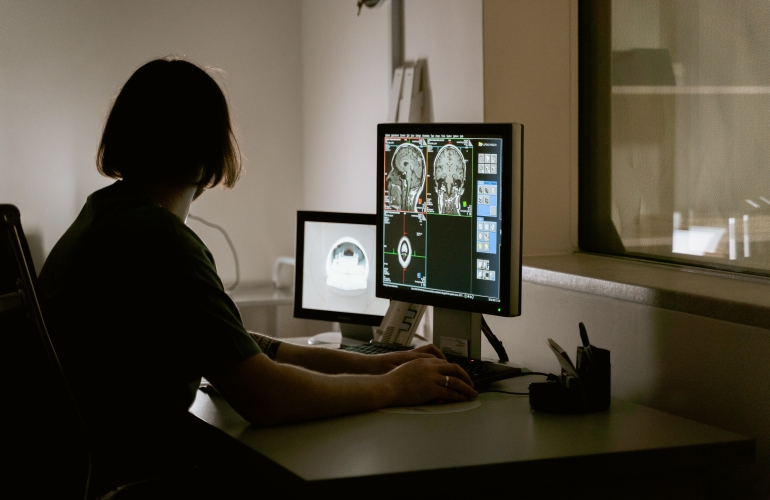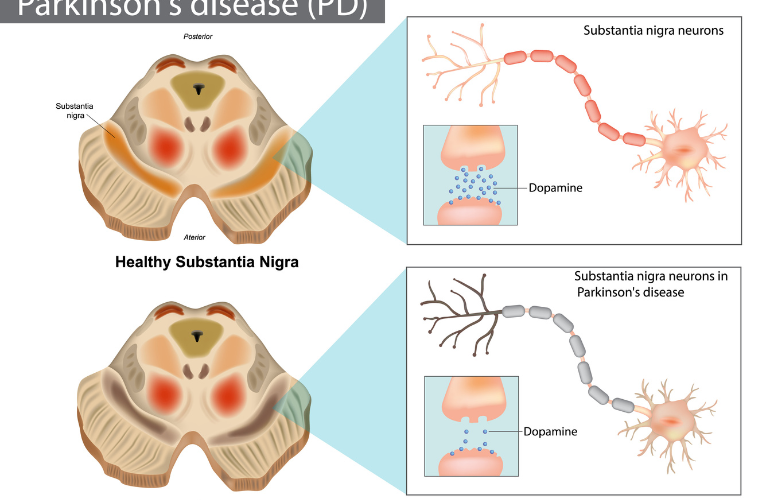Stages of Parkinson’s disease


View all articles in the category of: About Parkinson's
Table of contents
If you or a loved one has been diagnosed with Parkinson’s disease, you might probably be wondering what the future holds. Parkinson’s is a progressive disease - meaning that it gets worse over time, but how Parkinson’s disease progresses won’t be the same for everyone. You won’t experience it the same way as someone else with Parkinson’s. So, the outlook varies from one person to another.
However, it is helpful to think about Parkinson’s disease progression in terms of different stages. The simplest way is in three stages.
What are the three stages of Parkinson’s disease?
Generally speaking, Parkinson’s disease can be broken down into three stages – mild (or early), moderate and advanced. How long it takes for the disease to progress depends on various factors including your diet, exercise and the availability of treatment.
However, this is how the stages are generally categorised.
Mild or early stage of Parkinson’s disease
This stage can last several years. The first signs of Parkinson’s disease may be noticeable, but you can carry on doing most things. Sometimes you may not be able to move as much, or as quickly (due to slowness of movement or bradykinesia) and you may have shaking (tremors), often down one side. This may mean daily routines such as getting dressed take longer. A good diet and lots of exercise may also help, along with medication if it’s available.
You may also experience:
- problems with sleep
- depression
- anxiety
- apathy
- bowel problems such as constipation
- loss of smell
- reduced facial expressions
Moderate Parkinson’s disease
After the mild stage is over, you may see symptoms gradually worsen. Your tremors and stiffness can get worse, and movements may be slower and more reduced. You may need help with getting dressed or other daily tasks. Falls are more common now too as your balance and coordination worsens.
You might also find that you become more forgetful or disorganised and may not be able to focus on anything for too long. Any medication you’re taking might not be as effective as it was during the early stage of Parkinson’s. Nevertheless, many people with Parkinson’s at this stage can still lead full and relatively independent lives.
At this stage you may also find that you:
- need to urinate more urgently
- can only speak softly
- freeze when walking
- have difficulty swallowing
Advanced Parkinson’s disease
The advanced stage of Parkinson’s is not as common as the earlier two., but it depends how long you’ve been living with the disease. If you’ve had Parkinson’s for at least 10 years, your symptoms are more likely to become complex. However, studies show that if you’re diagnosed at a younger age, you’re likely to be living with the disease for longer than this before it progresses to an advanced stage. With the right and effective treatment, many people’s symptoms will remain in the moderate stage
In the advanced stage, your quality of life becomes poorer as serious disabilities may start and your medication won’t help as much. You will probably need daily care and will be unable to live alone if your condition progresses to this stage. Dementia in Parkinson’s disease is also a possibility. This is when serious memory problems set in.
You may:
- experience delusions and other serious mental health issues
- find it very difficult to speak
- need a wheelchair or walking aid
- be confined to bed for much of your time
Other classifications (Hoehn and Yahr) of Parkinson’s disease?
Your healthcare professionals may also break Parkinson’s disease into stages using the Hoehn and Yahr scale. This has five stages, which can roughly correspond to the three stages of mild, moderate and advanced.
They are:
- Stage 1, which corresponds to the mild or early stage.
- Stage 2 and stage 3, which correspond to the moderate stage
- Stage 4 and stage 5, which correspond to the advanced stage – stage 5 may also be referred to as the end stage of Parkinson’s disease
It’s important to remember that although Parkinson’s disease complications can become life-threatening in its advanced stages, it is not fatal. You can continue to manage your symptoms well enough to lead a happy and full life.
Read more about medical treatments for Parkinson’s and how diet and exercise can help keep your symptoms in check.
You can also see what support is available to you.
Sources (all accessed May 2022):
- Hoehn MM, Yahr MD. Parkinsonism: onset, progression and mortality. Neurology. 1967;17(5):427-442.
- https://www.medicalnewstoday.com/articles/parkinsons-life-expectancy
- https://www.medicalnewstoday.com/articles/320476#rating-scales
- https://www.movementdisorders.org/MDS-Files1/PDFs/Rating-Scales/MDS-UPDRS_English_FINAL.pdf
- https://www.ncbi.nlm.nih.gov/pmc/articles/PMC2605160/
- https://www.ncbi.nlm.nih.gov/pmc/articles/PMC4372387/#R44
- https://www.ncbi.nlm.nih.gov/pmc/articles/PMC5514193/
- https://www.ncbi.nlm.nih.gov/pmc/articles/PMC2897716/
- https://www.parkinsonsresource.org/news/articles/five-stages-of-parkinsons/
- https://pubmed.ncbi.nlm.nih.gov/15338272/
- https://www.webmd.com/parkinsons-disease/guide/parkinsons-disease-progression
- https://www.uptodate.com/contents/parkinson-disease-symptoms-and-diagnosis-beyond-the-basics
- https://www.uptodate.com/contents/etiology-and-pathogenesis-of-parkinson-disease
- https://www.nice.org.uk/guidance/ng71https://www.michaeljfox.org/sites/default/files/media/document/Guide_For_Newly_Diagnosed_120921.pdf
View all articles in the category of: About Parkinson's
Return to ArticlesDisclaimer
This article has been put together for informational and educational purposes only. It should not be interpreted to be a diagnosis, treatment or any other type of health care advice. The reader should seek their own medical or professional advice and must not rely on the information contained in this article as an alternative to medical advice from their doctors or other professional healthcare providers. Parkinson's Africa disclaims any responsibility and liability of any kind in connection with the reader’s use of the information.